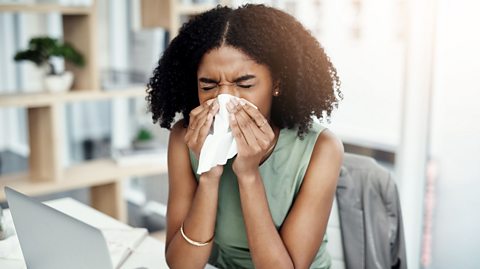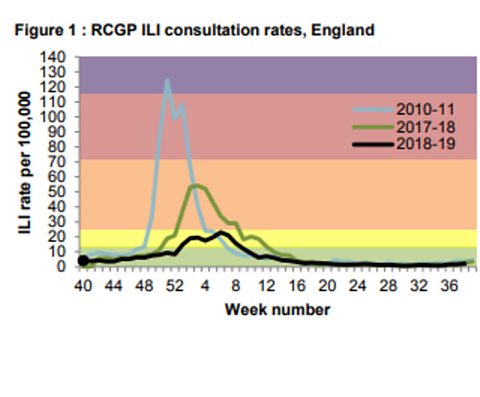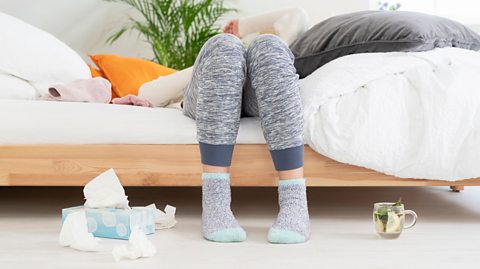This article was published in October 2019
It’s that time of year again.
Chances are you’re starting to be deafened by a constant symphony of sniffs, sneezes and interrupted by the occasional “there’s definitely something going round at the moment”.

 Image source, Public Health England
Image source, Public Health EnglandWinter does seem to come hand-in-hand with snotty noses. According to Public Health England, between November and February, the number of cases of flu-like illnesses dealt with by GPs is higher than at any other point in the year.
GP Dr Simon Bowers explains that illnesses don’t exclusively go around at this time of year. “There’s always stuff going round… because there are bugs that are in the air all the time.”
Despite their name, Dr Bowers explained that it’s actually quite strange that colds thrive in winter.
 Image source, Public Health England
Image source, Public Health England“It’s an odd one because you would expect the cold weather to scare the bacteria off because they need to operate at room temperature”.
So if bugs are going round all the time, and cold weather should drive off bacteria, why do people seem to get ill more often in winter? There are a number of different theories. One is that we spend more time indoors together in the winter in close contact with other people.
Being stuck indoors together helps bugs to spread
“Populations of microorganisms can evolve to exploit the best circumstances for their growth, which is a load of humans stuck inside because the weather’s rubbish” Dr Bowers said.
Another bug that spikes when people are spending more time together is chicken pox: “People will say ‘oh chicken pox is going round like wildfire at the minute’, but this is a virus that exists at all times across communities, and we just see clusters of the primary infection in children as children go to school and start mixing together, so it’s not necessarily seasonal.”
Being less active reduces our immune system
“We tend to be less active in the winter and therefore our immune system’s slightly less robust,” says Dr Bowers.
There have been numerous studies that show more exercise can help the immune system, such as one in 2018 by Kings College London that found older people's immune systems were prevented from declining when they excercised.

Please wash your hands
Some of the nasty bugs that involve spending a lot of time on the toilet go around in very localised areas because of how they travel: “They’re spread by feco-oral contact, so people not washing their hands properly, touching a toilet flush or bathroom door.” This means that any spikes in winter are purely coincidental.
Being exposed to bugs improves our immune system
Dr Bowers thinks it’s unlikely we are going to avoid most illnesses going round entirely.
He said: “the most important thing you can do" for your kids is to vaccinate them against infectious diseases, in order to prevent the most deadly of them.
"But it’s also important that we don’t hide from colds and flus altogether, as our immune systems need to come into contact with them in order to know how to fight them in the future.
“I wouldn’t want the common cold or a snotty nose or something to make us think ‘oh well, I won’t mix, I’ll sit here on my own’. The human immune system gets us to healthy adulthood by getting used to all these bugs that are going round.”
The technique has certainly worked for Dr Bowers, who barely ever gets colds these days: “I’ve developed a fairly robust immunity by being exposed to loads of bugs, simply by being a GP.”
It may seem strange, but if you want to avoid the winter sniffles, the doctor’s orders are to get ill a few times - that way your immune system knows what it’s dealing with when the bugs try and get you next time.
Dr Alex debunks health myths
Does chicken soup cure a cold? The Love Island star has the answer to this - and more.

Five potential health benefits of music
From weight loss to preventing snoring, music has a special way of keeping us healthy. Find out how here.

Korina: medicine management technician
Korina is a medicine management technician in the NHS.
